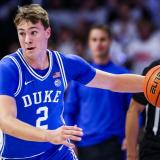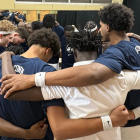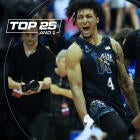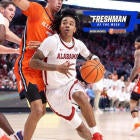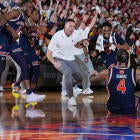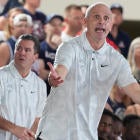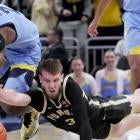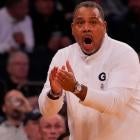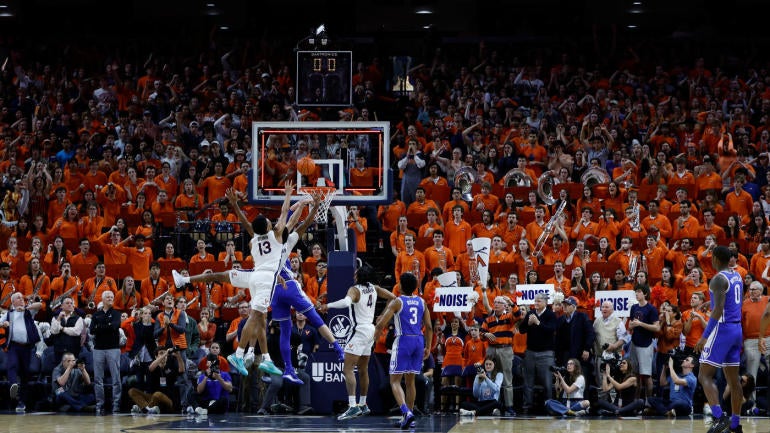
Another late no-call after a lengthy review by officials led to another Duke loss in conference play Saturday as the Blue Devils lost 69-62 in overtime to No. 8 Virginia.
Weeks after star freshman Kyle Filipowski was punched in the throat late in a game vs. Virginia Tech -- which was reviewed and determined it did not warrant a flagrant foul -- officials on Saturday once again reviewed a play involving Filipowski that would have decided the game and potentially flipped it in favor of Duke. Just like weeks ago, officials opted to officially not call a foul, which the ACC late on Saturday admitted was a mistake.
"The Atlantic Coast Conference, upon review of the final play of regulation during the Duke at Virginia men's basketball game, has announced an incorrect adjudication of the playing rules," the ACC's statement said. "A foul was called on Virginia's Ryan Dunn during a shot attempt by Duke's Kyle Filipowski as time expired. Upon the officials' review of the play, it was determined that the foul committed occurred after the clock reached 0.0. However, the play should have resulted in two free throws for Duke."
With the game knotted at 58 in the final seconds of regulation of a back-and-forth game vs. the Cavaliers, Filipowski went up for a layup to potentially win the game and missed the shot at the rim as time expired. Officials initially called a foul on the play, but after a review they waved off the foul and sent the game to overtime.
Upon further review: Duke got hosed on the road at UVA. Kyle Filipowski should have had a chance to win it at the free throw line in regulation. Not sure how you overturn this foul call. pic.twitter.com/YQSSKpZwtw
— Kyle Boone (@Kyle__Boone) February 11, 2023
CBS Sports' Matt Norlander spoke with an officiating source after the game who said it appeared that an illegal contact foul was committed by Virginia on the play but officials during the review likely determined that it happened after the clock hit zero. That was, according to the ACC, an incorrect adjudication of the rules that should have -- but did not -- resulted in two Duke free throws.
"Per Rule 5, Section 7, Article 3c of the NCAA Rule Book, while a foul occurred after expiration of play, the ball was still in flight, thus the student-athlete should have been granted two free throw attempts," the ACC statement continued.
"Rule 5, Section 7, Article 3c states "when a foul occurs so near the expiration of time that the official timer cannot stop the game clock before time expires or when the foul occurs after time expires but while the ball is in flight during a try, the period shall end when the free throw(s) and all related activity have been completed.
"A.R. 130, Section 2 of the NCAA Casebook notes in a scenario where "Shooter A1 releases the ball, time expires, A1 is fouled while the ball in in flight and the try is unsuccessful, since the try was released before the expiration of time and since the foul occurred after time expired but while the ball was in flight and A1 was an airborne shooter, A1 shall attempt two free throws even if the first is successful. When both free throws are unsuccessful, the game continues with an extra period(s)."
Duke coach Jon Scheyer handled the incident with grace after the game in admitting the final play of regulation was chaotic and confusing. He did not go on the offensive but instead asked for clarification, which he got in part by the officials later, though he said he still wasn't completely clear whether what happened was handled correctly.
"[The officials] told me after the fact that the call was made after the buzzer," said Scheyer. "You can see the ball left his hands before 0.00. I don't exactly know what the rule was. The call was made so I don't know how the call can get taken away. But again, I just would like clarity. Hate it for our guys."
Had the foul call stood, Filipowski, a 77% free-throw shooter entering the game (who was 0-for-2 from the line vs. UVA) would have been sent to the free-throw line to shoot two shots and potentially win the game in regulation for Duke. Instead, the Cavaliers used the extra time to rally at home to a seven-point victory.







